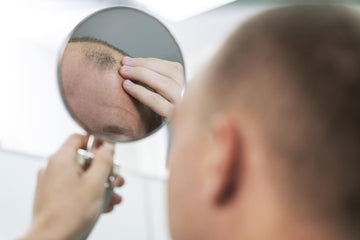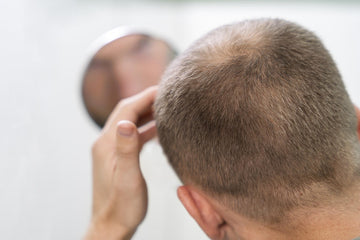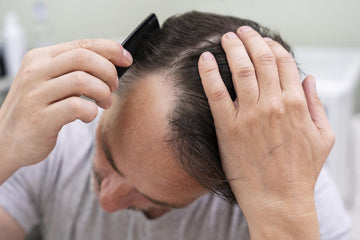Does Metformin Cause Hair Loss?

Marinella Helera • Aug 04, 2025
Metformin is one of the most commonly prescribed medications for Type 2 diabetes, and it’s also used for PCOS and weight management.
However, many people wonder: Does metformin cause hair loss? It’s a growing concern, especially as online forums are filled with mixed experiences and no clear answers. Some users report noticeable shedding, while others see no change or even improvement in their hair health.
This article will help you break down everything – clearly and simply. We’ll explore whether metformin causes hair loss, why some users notice hair shedding while taking it, and how you can prevent or reduce hair loss.
What Is Metformin and Why Is It Prescribed?
Metformin is a first-line medication for Type 2 diabetes. Its primary job is to help manage blood sugar levels, which is crucial for preventing long-term complications such as nerve damage, heart disease, and kidney problems.
How Metformin Works
Metformin controls blood sugar in two key ways:
-
Reduces glucose production in the liver: Your liver naturally makes sugar (glucose) to give your body energy. In Type 2 diabetes, the liver often produces too much glucose, which spikes your blood sugar levels. Metformin slows down this process.
-
Improves insulin sensitivity: Insulin is the hormone that helps move sugar from your blood into your cells. When your body becomes resistant to insulin, sugar builds up in the blood. Metformin helps your body use insulin more effectively, allowing glucose to enter your cells where it’s needed for energy.
Aside from diabetes, doctors may also prescribe metformin for other conditions, such as:
-
Polycystic ovary syndrome (PCOS) – It helps reduce insulin resistance and may improve hormone balance.
-
Weight management – Some people experience mild weight loss as their insulin levels stabilize.
Since it is effective, affordable, and generally well-tolerated, metformin is considered a first-line treatment. However, some users have wondered whether it has unexpected side effects – like hair loss, which we’ll explore next.
Does Metformin Cause Hair Loss?
The short answer is: not usually. Hair loss isn’t a common or officially listed side effect of metformin.
According to medical sources such as Healthline and Medical News Today, metformin doesn’t typically cause hair loss. Clinical trials and medication inserts rarely list it as a side effect.
However, this doesn’t mean the worry is completely unfounded. Some people who take metformin have reported increased shedding or thinning hair. While these stories are mostly anecdotal – meaning they come from individual experiences, not clinical studies – they’re common enough that many patients are asking the same question.
So what could be the reason?
In most cases, metformin is not directly to blame. The medication doesn’t attack hair follicles or directly interfere with growth cycles. Instead, the connection is often indirect. Hair loss may be triggered by vitamin deficiencies, hormonal shifts, or the underlying condition that metformin treats —such as diabetes or PCOS.
Why Hair Loss May Happen While Taking Metformin
If your hair has started thinning or shedding after starting metformin, several factors might be at play. Let’s break down the most common reasons why metformin causes hair loss:
Nutrient Deficiencies
One of the most common reasons people may experience hair loss while taking metformin is due to vitamin deficiencies – particularly vitamin B12 and folate (vitamin B9).
Metformin can interfere with the body’s ability to absorb B12 and folate over time. These vitamins are essential for healthy red blood cells, which deliver oxygen to tissues, including your hair follicles. When your body is low on B12, it may not produce enough healthy red blood cells, leading to a condition called megaloblastic anemia.
Without proper oxygen and nutrients, your hair follicles can become weaker, enter a resting phase, and eventually shed. This kind of hair loss often looks like diffuse thinning – where hair becomes evenly sparse across the scalp, rather than forming patches.
Underlying Diabetes Effects
It’s important to remember that Type 2 diabetes – the condition metformin is often prescribed to treat – can itself be a major cause of hair loss.
Here are a few ways diabetes may affect your hair:
-
Poor blood circulation is common in people with diabetes, and it can reduce the amount of oxygen and nutrients reaching your scalp and hair follicles.
-
High blood sugar levels can damage tiny blood vessels (capillaries) that feed the scalp, impacting follicle health.
-
Hormonal imbalances, especially related to insulin and cortisol (the stress hormone), can disrupt your hair’s natural growth cycle.
Hair grows in cycles: a growing phase, a resting phase, and a shedding phase. In people with diabetes, those cycles may be interrupted, which leads to slower regrowth or early shedding.
Weight Loss or Stress
Another common scenario is hair loss following weight loss, which often happens when people begin taking metformin – especially if they’ve changed their diet or started exercising more.
This kind of hair loss is often due to a condition called telogen effluvium, a temporary form of hair shedding triggered by:
-
Rapid or significant weight loss
-
Sudden dietary changes
-
Physical or emotional stress
When your body goes through a major change – such as losing weight quickly – it often responds by putting hair follicles into a resting state. A few months later, the resting hair sheds, which appears as a sudden fall out.
Hormonal Imbalances
Metformin helps improve insulin sensitivity, which can influence other hormones in your body. In people with PCOS (polycystic ovary syndrome), these hormonal shifts can impact androgens and may lead to:
-
Thinning hair on the scalp (androgenic alopecia)
-
Excess facial or body hair (known as hirsutism)
The effect is usually not permanent, and hair growth often returns to normal as your hormones balance over time.
Is Hair Loss From Metformin Permanent?
Luckily, hair loss related to metformin is usually temporary and reversible. Once you identify the root cause – whether it’s a vitamin deficiency, stress, or hormonal change – and properly treat it, hair can start to regrow naturally.
For many people, regrowth starts within 3-6 months after treatment or supplementation begins.
Remember, the key is to catch the issue early and take action. If you suspect your hair loss is from metformin or any other factor, consult your doctor, get tested, and take proactive steps to support your hair and overall health.
Signs Your Hair Loss May Be Linked to Metformin
Wondering whether metformin could be behind your thinning hair? If so, here are some clues to look out for:
-
Timing: Did your hair start thinning a few weeks or months after you started metformin? If yes, the timing could point to a connection. Hair loss often doesn’t happen immediately – it may take time for nutrient levels to drop or for your body to respond to hormonal changes.
-
Unusual fatigue or tingling: Feeling tired, weak, or noticing tingling or numbness in your hands or feet could be signs of vitamin B12 deficiency – a known side effect of long-term metformin use. Since B12 is crucial for hair growth, low levels can lead to shedding.
-
Diffuse hair loss: Is your hair falling out evenly across your entire scalp, rather than in round bald patches or along a receding hairline? This is called diffuse shedding and is commonly linked to nutrient deficiencies or stress-related triggers, not genetic hair loss.
-
No strong family history: If male- or female-pattern baldness doesn’t run in your family, and your hair loss came on suddenly or noticeably after taking metformin, it may be due to a temporary issue like a vitamin imbalance or metabolic stress.
-
No major stress or illness: If you haven’t gone through a recent emotional trauma, surgery, crash diet, or other significant life change, but are still shedding hair, the cause might be internal, like a medication-related nutrient depletion.
These signs point toward nutritional or metabolic triggers, which can often be corrected with medical guidance and proper care.
How to Prevent or Reduce Hair Loss While on Metformin
The best strategy is to be proactive — don’t wait until your hair is visibly thinning. Here are some actionable steps you can take to protect (and support) your hair health while continuing metformin:
Check Nutrient Levels
One effective thing you can do is to monitor your vitamin and mineral levels regularly, especially if you’re taking metformin for several months or longer.
The medication can block (as we mentioned) the absorption of certain nutrients over time, most notably:
-
Vitamin B12
-
Folate (Vitamin B9)
-
Iron
Low levels of any of these can contribute to hair thinning, fatigue, and poor scalp circulation.
Ask your doctor to run blood tests every 6 to 12 months. If your levels are low, you may need to take oral supplements, or in more severe cases, vitamin B12 injections for faster results.
Treating deficiencies early can help stop shedding before it becomes noticeable – and promote regrowth if thinning has already started.
Improve Your Diet
Nutrition is the foundation of healthy hair. Even if you’re not deficient in key nutrients, eating a well-balanced diet can support stronger, thicker hair.
Here are a few things you should consider:
-
Lean proteins: Chicken, fish, turkey, eggs, and beans are rich in amino acids that form keratin – the protein that makes up your hair.
-
Green leafy vegetables: Spinach, kale, and Swiss chard are packed with iron and folate.
-
Whole grains and legumes: These provide zinc and biotin, vital for hair strength and structure.
-
Healthy fats: Avocados, nuts, seeds, and olive oil help keep your scalp moisturized and hair soft and shiny.
A poor or restrictive diet – particularly one low in protein or iron – can lead to hair thinning. Metformin users who are also making lifestyle changes for weight management should be mindful not to skip essential nutrients.
Use Supportive Hair Products
Believe it or not, your hair care routine matters more than you think. Using the right products can help strengthen existing hair, support scalp health, and even reduce the hormone DHT, which is linked to male-pattern baldness.
Make sure to look for hair care products that:
-
Are free of harsh chemicals such as sulfates and parabens
-
Contain DHT blockers (like saw palmetto or caffeine)
-
Are designed to stimulate the scalp and nourish follicles
Add Hair Growth Supplements
Sometimes, even the best diet and hair care routine needs a little extra support. That’s where targeted hair growth supplements can make a difference.
Spartan hair growth products are formulated with powerful ingredients such as:
-
Biotin, which improves hair strength and texture
-
Zinc, essential for hair tissue repair and growth
-
Vitamin B12, to combat deficiency-related hair thinning
-
Vitamin D, selenium, and other nutrients that support overall hair and scalp health
When you take these products and supplements daily, they can fill in nutritional gaps and provide your follicles with the fuel they need to stay strong and productive.
Other Causes of Hair Loss in Diabetes Patients
If you have diabetes and are experiencing hair loss, it’s important to understand that the cause may go beyond just medication.
Diabetes can lead to hair thinning through several different pathways, such as:
-
High blood sugar: Chronically high blood sugar levels can damage small blood vessels in the body, including those that supply your hair follicles. Poor circulation can reduce oxygen and nutrient delivery to the scalp, which weakens follicles and slows hair growth.
-
Emotional stress: Managing diabetes can be emotionally and physically stressful. Stress is a well-known trigger for a condition called telogen effluvium, which causes temporary hair shedding as your body reacts to mental or physical strain.
-
Thyroid disorders: Hormonal imbalances such as thyroid disorders are more common in people with diabetes, especially Type 1. Both hypothyroidism and hyperthyroidism can cause thinning hair, brittle strands, and even scalp dryness.
Because hair loss can stem from various sources, it’s crucial to look at the whole picture – and not just one potential cause.
When to See a Doctor
It’s time to consult your healthcare provider if you notice:
-
Sudden or severe hair loss that seems out of the ordinary
-
Symptoms like fatigue, pale skin, or tingling in your limbs (which could indicate anemia or B12 deficiency)
-
You're unsure whether the hair loss is due to medication, diabetes, or another underlying condition
A doctor can order the right tests, assess your nutrient levels, and help rule out more serious conditions like thyroid disease or autoimmune disorders.
Spartan’s Approach to Supporting Hair Health
If you’re struggling with thinning hair while managing diabetes or metformin treatment, Spartan offers targeted solutions for men looking to protect and revitalize their hair.
Here’s how our targeted approach works:
-
Spartan Root Activator Shampoo: Formulated to gently cleanse your scalp without stripping away natural oils, this shampoo contains DHT blockers and nourishing botanical extracts. DHT is a hormone linked to male pattern baldness, and reducing its impact helps protect hair follicles and encourage thicker growth.
-
Spartan Root Activator Conditioner: After cleansing, this lightweight conditioner hydrates and nourishes the scalp while strengthening existing strands. It helps minimize breakage, improves texture, and creates an ideal environment for hair to thrive.
-
Spartan Root Activator Spray: Our leave-in spray delivers targeted, fast-acting ingredients directly to thinning areas. Designed for direct-to-scalp application, it stimulates hair follicles and promotes visible regrowth over time.
Combined, these products offer a comprehensive system to support hair growth – even while managing metabolic conditions like diabetes.
Conclusion
Metformin typically does not cause hair loss directly. If hair loss occurs, it’s normally due to nutritional deficiencies, hormonal shifts, or the effects of diabetes itself – not the medication alone.
However, this type of hair loss is temporary and reversible. With the right approach – such as improving your diet, correcting nutrient deficiencies, and managing stress – your hair can bounce back.
If you experience thinning or want to protect your hair health while on metformin, Spartan’s scientifically backed hair growth system is designed to help men just like you.
Don’t wait until hair loss becomes more noticeable – start early, stay consistent, and give your hair the support it needs to thrive. Explore the Spartan collection today and take the first step toward stronger, healthier hair.







